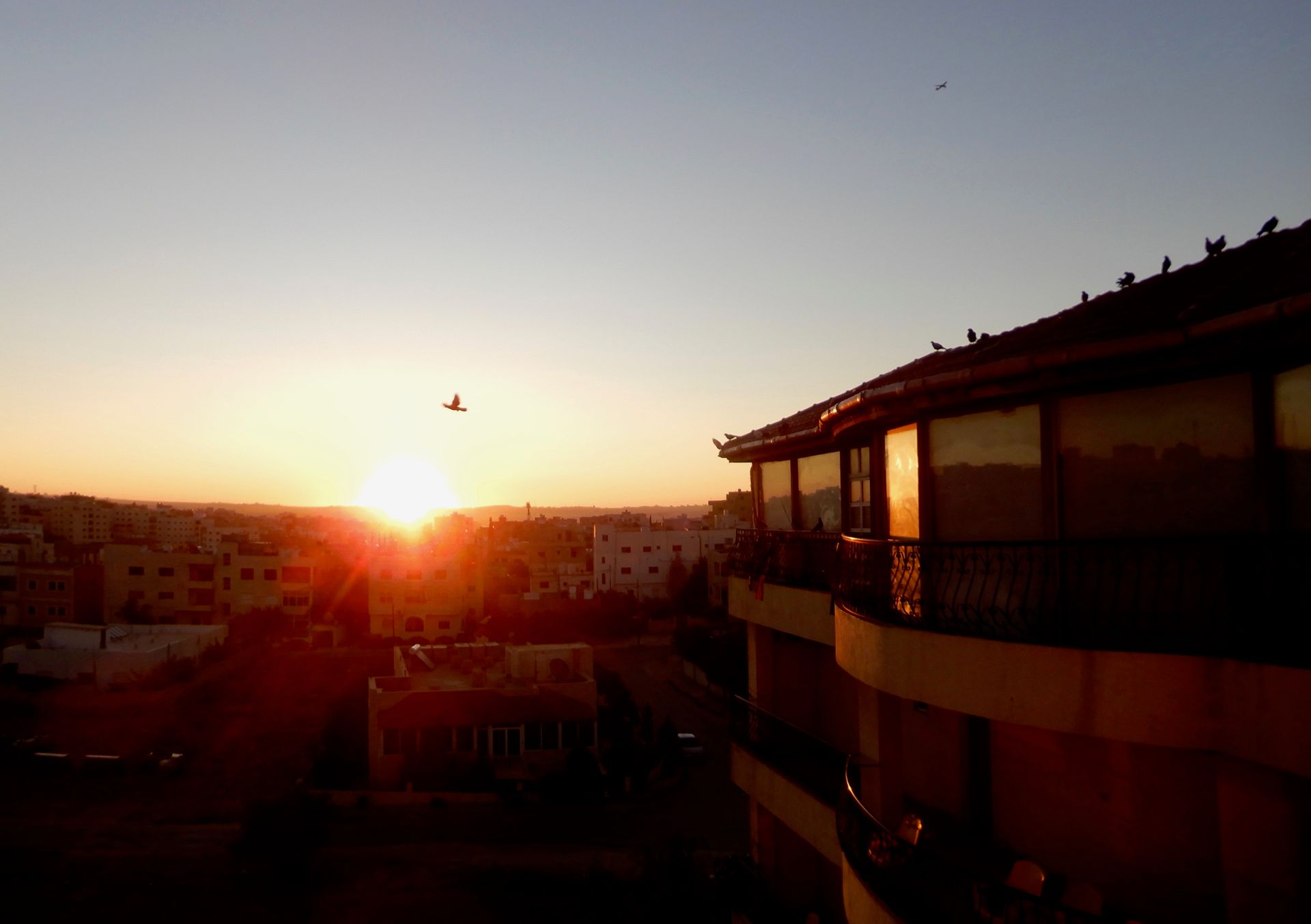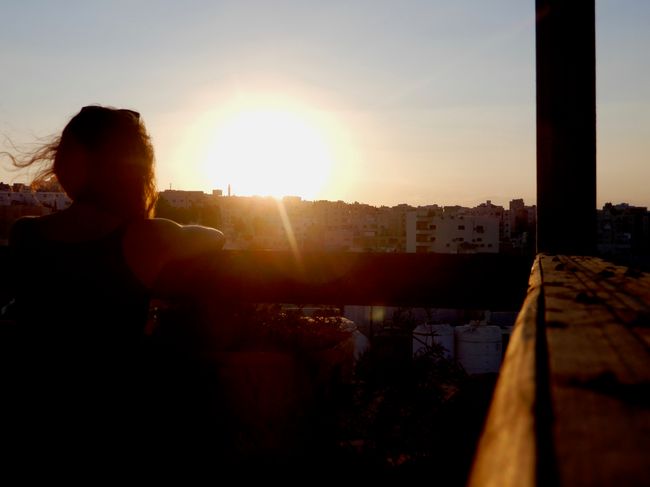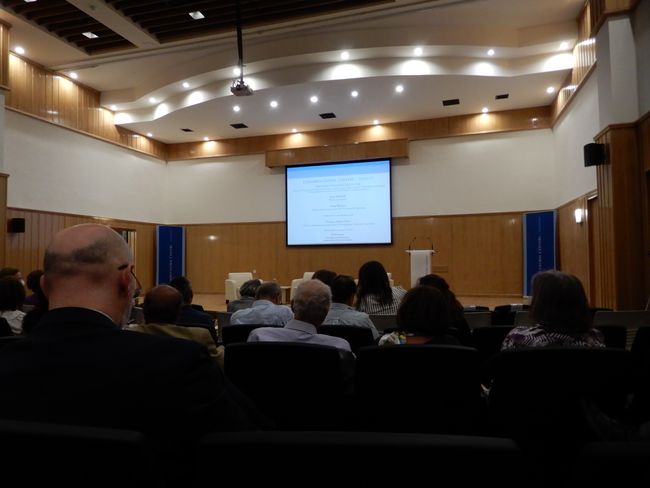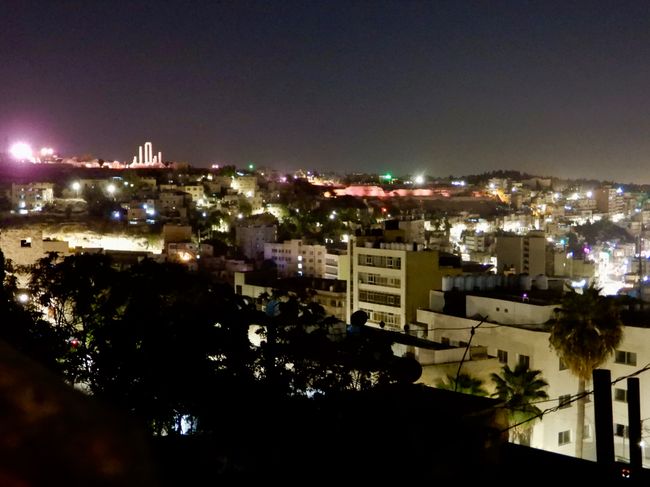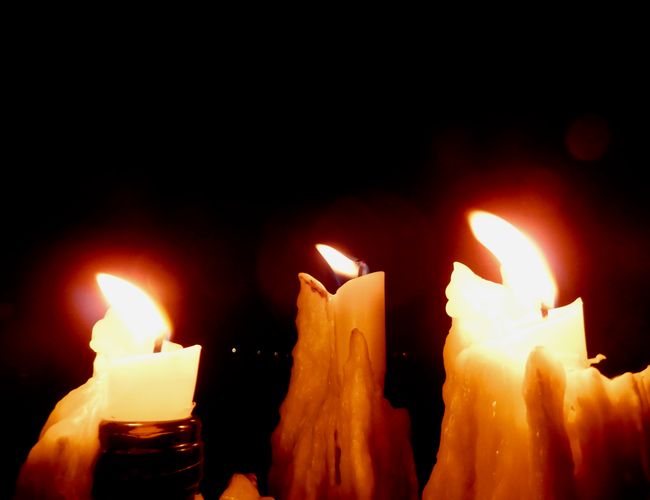Writing/Walking Palestine
Објавено: 11.10.2019
Претплатете се на билтенот
Wednesday, October 9th
8:30 a.m. The day starts as usual: jogging, a quick grocery shopping, a long breakfast. Today is also laundry day: water is scarce in Jordan, and for some reason that I haven't fully understood yet, you should always do your laundry on Wednesdays.
Our lecture starts an hour earlier than usual today: we received an invitation to an event taking place at the Columbia Global Centers, called "Writing/Walking Palestine". The theme is Palestine and the Palestinian city of Ramallah, which are the focus of the two books being presented there today. Participation is voluntary, and there are 8 of us, so we can exactly fit in two Uber taxis to get there. We've already seen on the map that the Columbia Center is a bit far from GJU, and now it feels like we've been driving for an eternity. The houses along the roadside get bigger and more modern as we get closer to the Columbia Center: we are in West Amman. "This is where the money is," Dr. Rawan told us yesterday, and now we see what she meant. The hotels and companies literally outdo each other with their monstrous and magnificent buildings, the streets get wider and cleaner, we see an unusually large number of well-maintained trees, avenues, and parks for Amman. It feels like a different world compared to the residential area in Downtown Amman. Even the air here is completely different, as we notice when we get out of our Uber at the Columbia Center. The smell of exhaust fumes, smoke, and garbage that dominates the center of Amman has transformed into the scent of pine trees that are planted in rows along the roadside here.
The Columbia Global Center belongs to Columbia University and is no less impressive than the surrounding buildings. When we enter the elegant auditorium, we wonder if we are a little underdressed. The women at the registration desk distribute us to the premises. There are two rooms, the main hall and a room where a live stream of the event is being broadcast. I am lucky to be assigned to the main hall. Soon, every seat in the room is taken, and it begins.
First, Penny Johnson presents her book. She is an American who has been living in Ramallah, Palestine for a long time. In her book titled "Companions in Conflict: Animals in Occupied Palestine", she describes how animals are also victims of the Israeli occupation in Palestine. She starts with the admission that Palestinians in the occupied territories may have bigger concerns than the well-being of the animals around them, but then she creates a transition with a comparison: "Animal: the most common insult. Human: the most common claim for justice." It becomes clear that her book is not only about animals, but also about how the animal world and vegetation have changed through the occupation and the conflict. Everything she describes also metaphorically represents the people living there. Based on the excerpts she reads out, it is a truly worth reading book.
Now, it's time for the introduction of Raja Shehadeh. He was born and raised in Ramallah and is Penny's husband. Raja studied law in London, but now he lives in Ramallah again and has written numerous books about the Israeli-Palestinian conflict and its consequences for the people on the ground. As he reads from his latest book "Going Home: A Walk Through Fifty Years of Occupation", there is absolute silence in the room. We all hang onto his every word as he vividly, in great detail, and incredibly emotionally describes his feelings and impressions when he walks through the streets of Ramallah. The occupation, as he describes it, follows him every step of the way, like a shadow. With every word he reads, we can feel how much the conflict has shaped him and influenced his life. And how hopeless the situation must be for the people in the occupied territories. "Since the Oslo Agreement, I gave up hope and accepted that occupation will go from bad to worse." I still know too little about this conflict, but I feel an increasing need to learn more about it. Even though I already know that more knowledge will come with pain and incomprehension. Raja's words are definitely very moving. And one sentence from Penny at the end of the subsequent Q&A session stays with me: "Hope is what you have when you know that things will be great, in the middle of a catastrophe."
After the reading and the Q&A session, Raja's book is sold in the auditorium. There is such a rush that all copies are sold out in no time. Clara, the Spaniard from our course, is lucky and manages to get the last one and have it signed. I will definitely buy and read the book at a bookshop before I hopefully manage to travel to Palestine within the next few months.
Part of our group has already gone back, so now there are only five of us, and we easily fit into a taxi back to the city center of Amman. I've noticed before that cars here rarely have only five people in them, and even the taxi drivers don't mind a little overweight in their vehicles.
Back in Jabal Amman, Rebecca and Lea have already gotten ready for a small rooftop party nearby. I join them a little later on a very cozy rooftop terrace, where we can enjoy a beautiful view of the Citadel while sitting on sofas in candlelight. A visit to the open-air museum there is definitely still on the to-do list.
The vocabulary:
Katastrophe- نكبة
weit weg- بعيد
nachdem- بعد
bei- عند
bevor- قبل
Претплатете се на билтенот
Одговори
